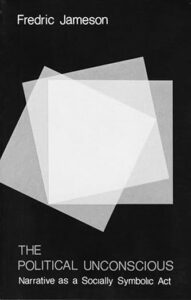Remarks on Jameson and Narrative
Under any house is a basement of psychological dimensions, a surplus affective space. And as I read The Political Unconscious into the night, a sump pump in the basement would go on and off, shunting gallons of water out of its perpetual flood. An editor asked me for a theory of such drainage in the form of a critical review, which I refused as not entirely serious. —”Foxes,” Bad History, 60
 The year is 1981. Carla Harryman and I are living in a working-class bungalow on Hampshire Street in San Francisco’s Mission District, competing with raccoon families and occasional gunshots to establish a relationship in an indeterminate time. Ronald Reagan has been elected, while the alternative arts are forging ahead on multiple agendas. Poets Theater is in full swing, with a character called “Jameson” in Kit Robinson’s play, as I discussed previously. Jameson has entered the Language and New Narrative debates and given his talk at 80 Langton Street, siding with Narrative while symptomatizing Language, but also has now published The Political Unconscious, a watershed work that would have long-term impact on questions of narrative and form. Jameson’s “questions of interpretation,” bringing together form and history, would anchor a more expansive, contextual methodology not confined to surface language—bypassing precisely the critique of Language’s dissociation of sensibility in the postmodern. The “turn to history” via poetic form begins right here. … More
The year is 1981. Carla Harryman and I are living in a working-class bungalow on Hampshire Street in San Francisco’s Mission District, competing with raccoon families and occasional gunshots to establish a relationship in an indeterminate time. Ronald Reagan has been elected, while the alternative arts are forging ahead on multiple agendas. Poets Theater is in full swing, with a character called “Jameson” in Kit Robinson’s play, as I discussed previously. Jameson has entered the Language and New Narrative debates and given his talk at 80 Langton Street, siding with Narrative while symptomatizing Language, but also has now published The Political Unconscious, a watershed work that would have long-term impact on questions of narrative and form. Jameson’s “questions of interpretation,” bringing together form and history, would anchor a more expansive, contextual methodology not confined to surface language—bypassing precisely the critique of Language’s dissociation of sensibility in the postmodern. The “turn to history” via poetic form begins right here. … More











